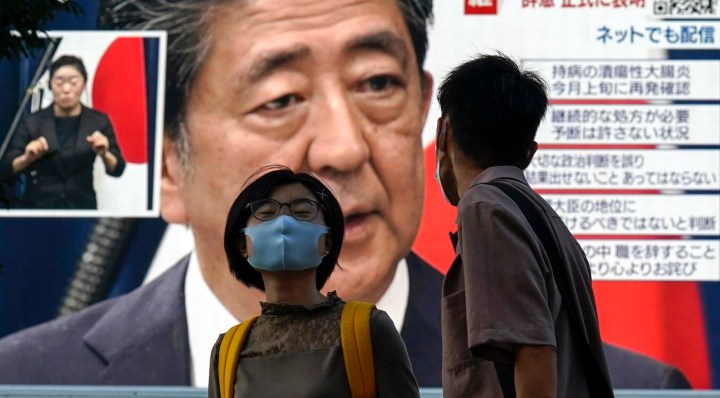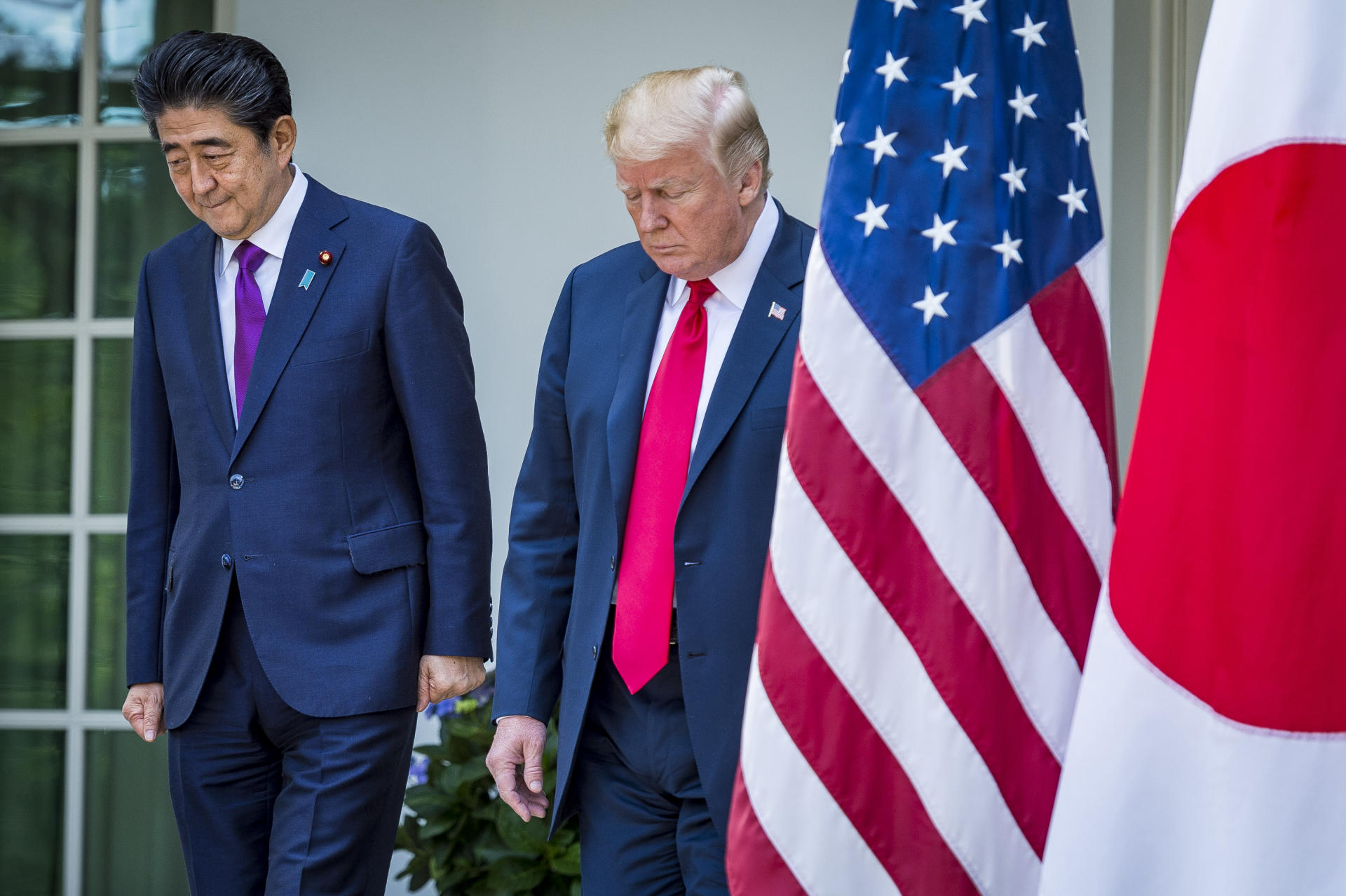World
Shinzo Abe’s endgame: Japan’s durable prime minister steps down

Japanese Prime Minister Shinzo Abe has decided to step down as the country’s leader, citing illness, but also in response to declining popularity over his handling of Covid-19. His departure now opens up a struggle for succession, even if the policies he put in place are unlikely to change. But the postponement of the 2020 Olympics may have been a real wound as well.
For nearly a decade, Prime Minister Shinzo Abe was that ultimate rarity in Japanese politics, a durable prime minister who far exceeded the usual short, nearly anonymous tenure as the country’s top politician. Counting his two periods at the top, in total, he ruled for close to a decade.
But things don’t always come out the way they are planned, not least because the Tokyo Olympics, meant as a capstone for Abe’s time in office, was postponed, if they ever happen. Instead, this past week, Shinzo Abe announced his departure from office due to an increasingly severe illness making it impossible for him to continue giving his all to his job.
As the BBC reported the prime minister’s decision, “his health started to decline as his ulcerative colitis made a resurgence around the middle of July. He was now receiving a new treatment for the condition which had to be administered on a regular basis and would not give him enough time to carry out his prime ministerial functions, he added. He said he could not make any mistakes in terms of important decision making, and therefore had decided to step down”.
In explaining this decision, Abe said, “I made a judgment I should not continue my job as a prime minister. I would like to sincerely apologise to the people of Japan for leaving my post with one year left in my term of office, and amid the coronavirus woes, while various policies are still in the process of being implemented.”
With a traditional bow of apology, he added regrets at being unable to make good on key pledges such as forcing North Korea to return Japanese citizens abducted decades ago (reportedly to serve as rather unwilling Japanese language instructors and maybe a sushi chef or two); sorting out a long-running territorial dispute with Russia over the southern Kurile Islands/Northern Territories seized by the Soviet Union in the final days of World War II that prevents the signing of a peace treaty between the two nations; and overhauling the Japanese constitution to give more flexibility and authority to the nation’s military, an idea that continues to be deeply divisive among Japanese, given national memory of the disaster that came about from World War II.
The current constitution, largely written by the American occupation forces, outlawed anything other than a limited role for self-defence forces. For years, these constitutional provisions have been cited as preventing military and security spending beyond 1% of GDP, or — with only minor exceptions such as very limited participation in UN peacekeeping operations — the deployment of Japanese forces beyond the immediate territorial limits of the country, either in association with the US or individually.
Announcing his resignation at a news conference, as the BBC reported it, Abe was “…repeatedly asked who he thought should replace him, or when, to which he said it wasn’t his place to weigh in. But the Liberal Democratic Party which has almost continuously been in power since 1955 has many different factions so the race is on between them to get the top job”.
The Liberal Democratic Party has traditionally been governed as a coalition of factions, or “ha”, with members of the Diet in the party aligned to one or another faction, with each one lined up behind a leading senior figure. These divisions are determined far less by policy differences than by personal allegiances. In the event of a prime ministerial succession, the usual pattern has been for the factions to negotiate among themselves as to whose turn at the wheel it is when it comes to choosing a prime minister. Then that person balances cabinet positions among the party’s various factions, usually roughly in accord with the respective strength of those respective allegiances.
To succeed Shinzo Abe, the spotlight on likely candidates has naturally fallen on Chief Cabinet Secretary Yoshihide Suga or Deputy Prime Minister and Finance Minister Taro Aso, although neither are likely to be voter favourites, given the steeply declining popularity of the Abe prime ministership for its handling of the Covid-19 pandemic, among other issues. Seiko Noda, a female member of the Diet, has also signalled her desire to become prime minister as well, but she is considered a distant outlier. Meanwhile, LDP policy chief Fumio Kishida is rumoured to be Shinzo Abe’s personal choice, but no matter who ends up on top of the heap, that individual is unlikely to deviate significantly from the government’s current policies, save perhaps at the margins or in tone.
As The Economist notes, “Kishida Fumio, the LDP’s head of policy, is believed to be Mr Abe’s favourite. Voters see him as competent, moderate and thoroughly uninspiring. Ishiba Shigeru, a former defence and agriculture minister, staked out a rare position as an Abe critic. He has broad support among the party’s rank and file, but few backers among its MPs. (Mr Abe may resign early to avoid a party-wide vote and thus block Mr Ishiba’s rise, argues Toshikawa Takao, editor of Tokyo Insideline, a political newsletter.) Mr Suga is a master at managing the bureaucracy, but has little foreign-policy experience. Kono Taro, the current defence minister, and Motegi Toshimitsu, the foreign minister, both have aspirations for higher office, though their candidacies are seen as long shots.
“The differences among them all are more of tone and tactics than of ideology. Finding differences on policy requires a microscope. Mr Kishida would carry Mr Abe’s flag, though he hails from a more centrist wing of the LDP, less wedded to Mr Abe’s priorities, such as revising the constitution. Mr Ishiba may favour more orthodox fiscal and monetary policy, but his room for manoeuvre would be limited after the pandemic. Mr Suga might devolve more power to local governments. Mr Kono casts himself as a maverick, having taken stances at odds with the party in opposition to nuclear energy and in favour of allowing the sons of female royals — or even (gasp!) the female royals themselves—to inherit the throne. Ultimately, the decision will come down to personalities and factional arithmetic. ‘The selection process is not really a policy choice,’ says Sone Yasunori of Keio University.”
In procedural terms, Abe’s announcement now automatically triggers a vote within his party to select the replacement as its new leader, and the party will decide as early as Tuesday on how and when to hold that actual election. That choice, in turn, leads to an all-parliamentary vote for the actual election of a new prime minister, almost certainly the person who has become the newly elected leader of the LDP. Regardless of who is the eventual winner in the succession contest, the newly chosen prime minister would only hold the post until the end of Shinzo Abe’s original five-year term of office which ends in September 2021.
Abe is a true scion of Japanese political royalty. One of his grandfathers was Nobusuke Kishi, a 1950s prime minister who rose to power after several years of incarceration immediately following World War II; and his father was Shintaro Abe, a longtime bigwig in the Liberal Democratic Party, who, among other offices, had served as cabinet secretary (a very powerful party/government office) and as foreign minister. The Liberal Democratic Party is the rough equivalent of a European centrist-style Christian Democratic Party, and it has had virtually untrammelled control of the government since its formation in the early 1950s, once Japan regained full political sovereignty and the end of the Allied occupation era.
Shinzo Abe had initially served as prime minister in 2007-8, until he surrendered his position in response to land acquisition/financial scandals by underlings and flare-ups of his chronic medical condition — ulcerative colitis — a condition that has now led to his resignation from the top national office for the second time. This second departure may also have been provoked earlier than the scheduled end of his term of office due to his administration’s accelerating collapse in popularity, due in part to its handling of Covid-19 issues.
Unlike most Japanese prime ministers, Abe had been in office long enough, and he had sufficient personal presence internationally, that he had been able to forge good relationships with several successive American presidents. Despite policy differences with their respective nations, he had worked hard to build good rapport with several iterations of leadership in South Korea and, crucially, with Chinese ruler Xi Jinping as well.
A key element of his time as prime minister had been — for Japan — a set of aggressive economic policies that were supposed to reignite the flaccid Japanese economy, a policy stance nicknamed “Abenomics.” Discussing the challenges any successor to Shinzo Abe must face, The Economist notes, “Whoever replaces Mr Abe will inherit immense problems: gargantuan public debt, a shrinking population and an economy that has been limping along for decades. But he will also wield great authority. During his long reign, Mr Abe has centralised decision-making, establishing a national security council and shifting power away from the bureaucracy. ‘To navigate a turbulent world, you need a strong prime minister — that pattern is embedded,’ says Tobias Harris of Teneo, a consultancy. ‘The institutional power will be there for a prime minister who manages to keep the LDP in his grip.’ ”

US President Donald J. Trump (R) and Japanese Prime Minister Shinzo Abe (L), walk from the Oval Office to the Rose Garden for a joint press conference at the White House in Washington, DC, USA, 07 June 2018. EPA-EFE/PETE MAROVICH
Shinzo Abe’s long run as prime minister has come to an end, but not in the manner he had hoped. Long political careers so rarely end the way the individual in question wants them to. In addition to the longtime economic languor that was supposed to have been addressed from the imposition of Keynesian-style “Abenomics”, Covid-19 has hit the country hard as well, even if the number of fatalities remains well below those of other nations in either absolute numbers or on a per capita basis.
But perhaps the biggest disappointments for Abe over his long tenure in office have been his government’s inability to reach a final accord with Russia over the disposition of those four small islands north of Hokkaido as one of the last unresolved territorial issues remaining from World War II.
Then there has been his inability to gain sufficient political traction and momentum to achieve a revision of the country’s constitution and thus open the door for revised US-Japan security relations. But there are also the continuing rumbles of dissatisfaction in South Korea (and China) over those yearly commemorations at the Yasukuni Shrine in Tokyo where the souls of Japan’s military (including several generals reviled for their actions during the war) are remembered.
But most unhappily for Abe, the 2020 Tokyo Olympics, designed to re-establish Japan’s pre-eminent reputation in the 21st century as an environmentally, industrially, and technologically potent, global power — thus serving as a fitting capstone for his tenure in office — has come unhinged because of a virus. This global sports event has now been postponed until 2021, if it even is to be held at all. Not the way Abe had hoped to wind up his prime ministership and seal his legacy. DM





 Become an Insider
Become an Insider